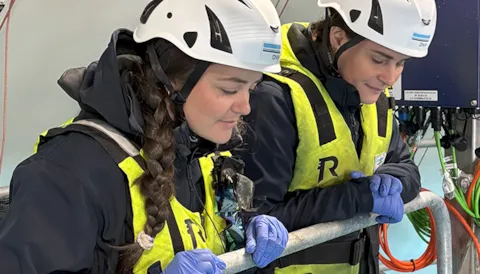Sustainability reporting is evolving rapidly – how will your business be affected?
With changes on the horizon impacting the way businesses worldwide report on their ESG performance, DNV’s Antonio Astone provides a behind-the-scenes look at the key trends and developments.
By Antonio Astone, Global Service Manager – Assurance and Supply Chain at DNV | September 2023
In the rapidly evolving field of sustainability reporting, significant changes are on the horizon. Businesses are experiencing a fundamental shift from viewing sustainability reporting as a voluntary initiative to a legal requirement with associated penalties for non-compliance. It's imperative that businesses understand these changes, including the specifics of what, when, and to whom they need to report.
Leading the way is the European Union with the introduction of the Corporate Sustainability Reporting Directive (CSRD) in January 2023. Companies will be required to adhere to these new rules, with the first reports expected in 2025, and some facing compliance requirements in the 2024 financial year.
For these reasons, the landscape of ESG (environmental, social, and governance) reporting and assurance standards and practices has experienced significant advancements over the past year.
Recognizing that existing voluntary standards often fall short of meeting the demands of today's sustainability-driven business environment, a multitude of initiatives are underway. These initiatives involve regulators, standard setters, ESG professionals and various stakeholders. Their collective goal is to establish more robust and precise reporting criteria, while ensuring adequate disclosure of ESG performance and enhancing the reliability of related assurance activities. Consequently, alongside traditional and longstanding reporting initiatives, new standards, guidelines, and practices are emerging.
As a direct result of this development, a clear trend has emerged: there is currently a wide array of ESG reporting standards and guidelines, including those tailored to specific domains, sustainability matters or industry sectors. Companies have begun to report while considering the criteria of more than one reporting standard. Within the realm of standardization, this scenario has generated a drive towards interoperability among these diverse standards.
Innovations are also prevalent on the ESG assurance front. Traditionally, ESG data assurance has taken two distinct approaches: one emphasizing the 'accounting verification' of data and information, while the other concentrates on the comprehensive assessment and evaluation of environmental, social, and governance policies and performances and related risks. The current trend, however, is a convergence of these two approaches, resulting in profession-agnostic standards that can incorporate the strengths of both approaches.
Furthermore, ESG assurance activities are confronted with a spectrum of novel challenges in response to the escalating demand for heightened verification precision. These challenges encompass the imperative to progress toward elevated levels of confidence, often referred to as 'reasonable assurance.' Additionally, there is a growing imperative to rigorously assess 'forward-looking information,' extending beyond historical data, in order to proactively anticipate and manage forthcoming risks and impacts.
A pivotal facet of this endeavor involves the development of novel criteria for effectively appraising performance and prospective risks associated with emerging themes, such as biodiversity and the potential human rights impacts stemming from an organization and its supply chain.
DNV actively participates in core working groups dedicated to this issue, leveraging our well-established expertise gained over more than two decades in supporting ESG disclosure and assurance activities.
As a concrete illustration, we have played an integral role in influential organizations and initiatives that are shaping the trajectory of global ESG assurance. These include:
- The International Ethics Standards Board for Accountants (IESBA), which in June announced that a Sustainability Reference Group (SRG) has been established to support the work of its Sustainability Task Force.
- The International Auditing and Assurance Standards Board (IAASB), which recently launched a public consultation on a landmark proposed global sustainability assurance standard (ISSA5000).
- The World Business Council for Sustainable Development (WBCSD), which worked on the new International Sustainability Standards Board’s (ISSB) global sustainability disclosure standards and on the new European Sustainability Reporting Standards by the European Financial Reporting Advisory Group (EFRAG).
- ISO's project to create a standard for verifying and validating sustainability information (ISO/AWI 14019-1 - Validation and verification of sustainability information — Part 1: General principles and requirements).
- The Taskforce on Nature-related Financial Disclosures (TNFD), which in September launched new recommendation guidelines, which is a key event for biodiversity and nature-related services.
As ESG reporting undergoes this transformation, companies that can adjust to these changes and align their ESG disclosure strategies will be best positioned to seize opportunities, thus shaping the future of sustainable business success.
Contact us for more information and to see how DNV can support your business with its sustainability needs.
9/27/2023 12:00:00 AM






